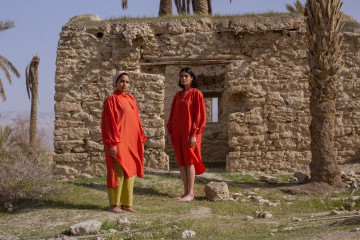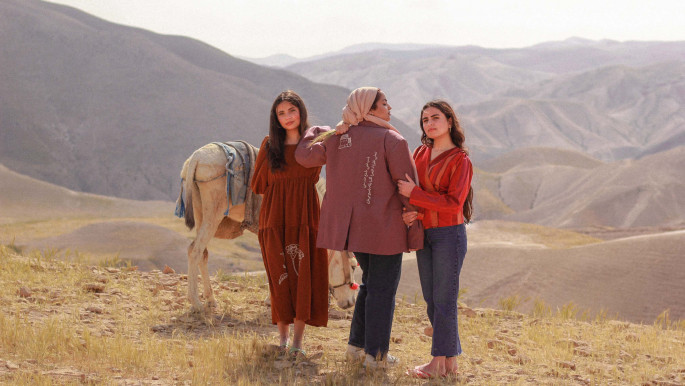

“Nöl was the combination of a few years of getting my hands all dirty in the fashion scene,” explains Yasmeen.
After creating t-shirts as a fundraising mechanism for BabyFist, a space to discuss sexual assault in Palestine, Yasmeen began to question the intersectionality between environmentalism, fashion and feminism, and the sustainability of these modes of production.
And so, Nöl (the Arabic word for the loom) was a metamorphosis of these discussions.
The clothes produced by Nöl are considered to be visual manuscripts of Palestine. They are inimitable due to the usage of the hyper-local in each stage of production; the yarns are naturally dyed with plants native to Palestine, such as sumac or indigo, and each collection is a homage to the land.
Their Fall 2022 collection is an ode to pomegranates, a fruit indigenous to Palestine and seen as a symbol of abundance and prosperity.
However, this fidelity to sustainability and environmentalism within the parameters of Palestine can limit the full capacity of Nöl, forcing Yasmeen to prioritise a textile-centred design process.
Yasmeen recalls her recent experience in preparing the Fall 2023 Collection for a fashion show in Copenhagen, where she was suddenly confronted with how onerous the fashion industry can be. “In Palestine, we do not necessarily have all the resources to make all designs all the time.”
The exemplar was a specific blue hand-woven jacket that had been approved by the team in Copenhagen. Yasmeen placed her order with her weavers in Gaza, but the colour was no longer available.
The blockade on Gaza makes it impossible for manufacturers to continuously import threads in all colours, as such the available colours are always changing and the design process at Nöl adheres to the same limitations.
However, this adherence to ethics and integrity is not inclusive to all Palestinian brands. The limited access to materials, labour, shipment and distribution has meant that various Palestinian brands are forced to export their production to Turkey or Jordan.
All the same, Nöl is steadfast in its commitment to preserving its Palestinian identity; “We are a small community of fashion designers in Palestine, we have to produce using limited resources which means it has to be less intricate.”
Yasmeen is just as concerned with the modes of production as the final outcome, and whilst both are beautiful in their way, there are tensions between producing clothing with female-led co-operatives out of joy, whilst competing with a market in which competitors may be more inclined to cut corners and maximise profits.
This is a particular problem in areas of the world where labour laws are lenient and consumers expect the cheap and fast.
In 2021 the average net daily wages in the West Bank and Gaza were $44 for men and $32 for women, according to the Palestinian Central Bureau of Statistics.
This phenomenon is exacerbated by the Palestinian Authority’s commitment to Special Economic Zones, industrial zones with notably laxed labour laws, dubbed by labour activists as an iteration of sweatshops.
This has also meant that much of Palestine’s agricultural land has been lost due to the establishment of industrial zones – farmers determined to stay in earmarked areas were served compulsory purchase orders by the Palestinian Authority. This has led to Palestinian labour becoming increasingly synonymous with cheap and less-environmentally conscious production.
"Nöl circumvents the exploitative and gendered practises of the global garment industry by collaborating with women’s cooperatives across Palestine"
“People assume that if it is made by a woman, it is somehow ethically made. Or that a ‘made in Palestine’ label makes a garment inherently ethical. But that’s not the case, we have factories that are dangerous and sexist. We have extremely inequitable pay structures.”
The usage of female co-operative labour has become more pronounced across the world as the conversation around diversity and social empowerment has risen.
However, Nöl circumvents the exploitative and gendered practises of the global garment industry by collaborating with women’s cooperatives across Palestine. Yasmeen recalls the complex relationship of female co-operatives in Palestine. “I dropped off a sample to the women’s co-operative and weeks passed but there was no development as they couldn’t find anyone to do the embroidery.”
Yasmeen decided to begin herself and slowly various family members and friends of the embroiderer joined, “that afternoon we were sitting, all embroidering together, laughing, eating, drinking; it was a feminine-communal space. But the minute you do it for pay, it is so different… it robs you of the joy.”
Yet, Yasmeen concedes the futility of discussing the intersectionality of environmentalism and fashion in Palestine without acknowledging the role of Israeli occupation and annexation within this stratification. “If you talk about the interconnected nature of natural dye processes, you can’t omit the role of ethnic cleansing.”
In specific, Majdalawi fabric, a commonly used fabric by Nöl, hails from the demolished town of al Majdal in the Gaza region. The producers were pushed to the edge of extinction because the village was demolished and built over. Now the fabric is handwoven in one of the last remaining artisan studios left in Palestine. Yasmeen laments, “we can’t talk about it without talking about that history.”
|
While Yasmeen is conscious of not being packaged as another Palestinian fashion brand but to show how her craft exceeds way beyond modes of resistance, she outlines her satisfaction with using her platform to not only produce clothes but to be a catalyst for educational conversations around occupation and entrepreneurship in Palestine: “I see the audience who have been following the work, most are receptive and open to learning about the reality of making clothing in Palestine,” she explains.
“For example, this week we had national strikes for the martyrs, the post closed, everything that is going on in Nablus right now, you can’t even reach the city… As a business, how do you schedule three-hour checkpoints? How do you schedule martyrs? How do you schedule national strikes?"
When asked what Yasmeen envisages for the future of Nöl, we reflected on the growth in popularity of skateboarding in Palestine and how Nöl could fuse the two together. "I believe skateboarding has been popularised in Palestine in ways it has in other countries like Afghanistan. It is counterintuitive to society’s stereotypes of women and I would like to play on this contradiction and duality by putting girls in tatreez dresses on the skateboard.”
For us, this is very telling of how Yasmeen and Nöl collective operates; always celebrating the rich and vibrant Palestinian heritage yet receptive to current trends and willing to combine the two to turn heads and push things into new directions.
While working within the constraints of the Israeli occupation of Palestine, Yasmeen is able to celebrate the slow fashion of working that female-led cooperatives under occupation have to deal with, but this then allows care and love to be materialised into the garments produced.
Although this makes the notion of a 'Spring Collection' difficult to plan so far in advance, it still leaves us excited for what is to come.
Aisha Kherallah is a freelance journalist and researcher focused on media freedom and cultural outputs in the MENA region. She holds an MSc in Conflict Studies from the London School of Economics and also works for the Rory Peck Trust.
Tom Critchley is a researcher and tutor in the Design Department of Goldsmiths University, London. He has been developing Zaatari Radio since 2017 and also works for Concrete Jungle Foundation.






 Follow the Middle East's top stories in English at The New Arab on Google News
Follow the Middle East's top stories in English at The New Arab on Google News


